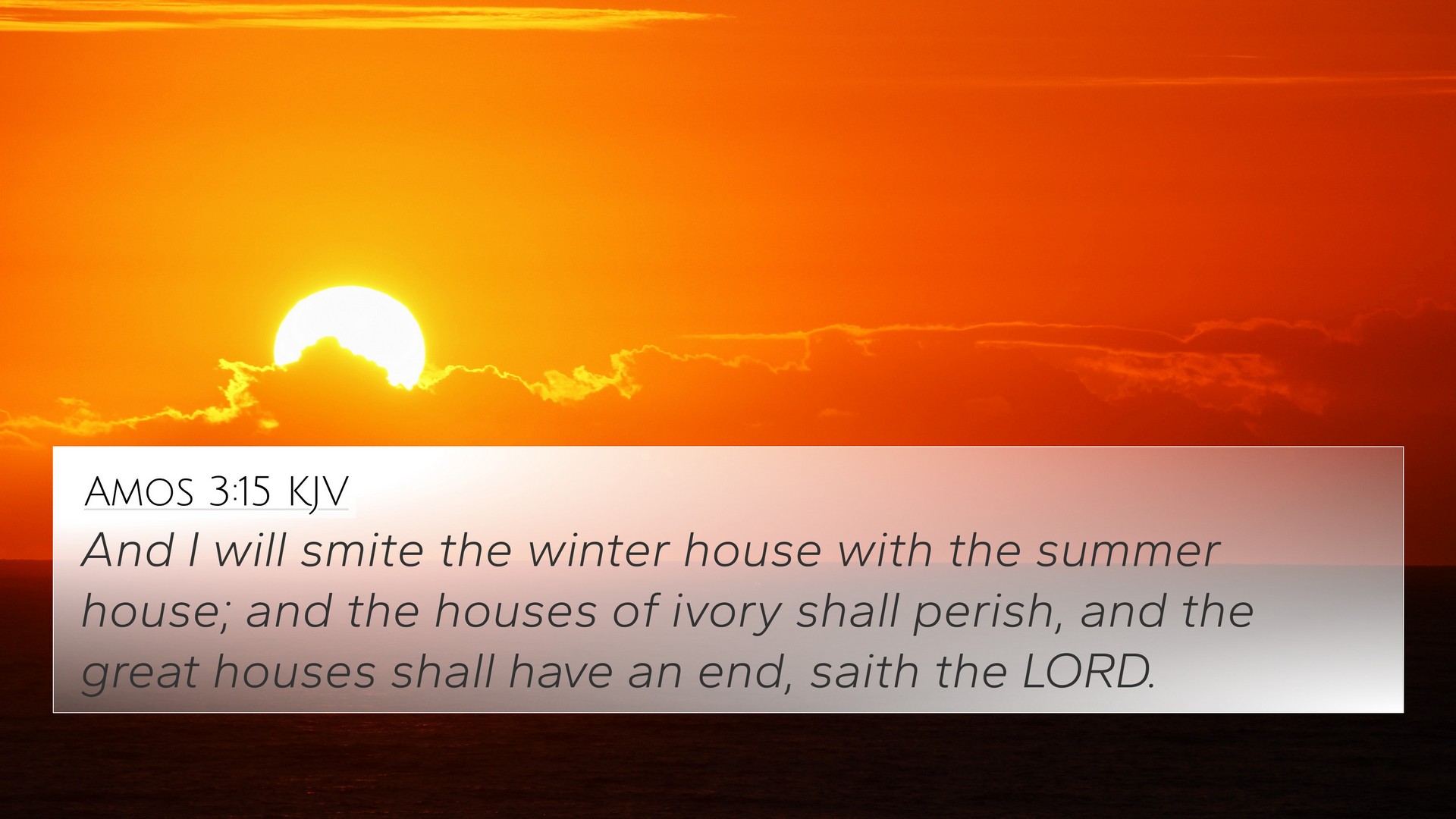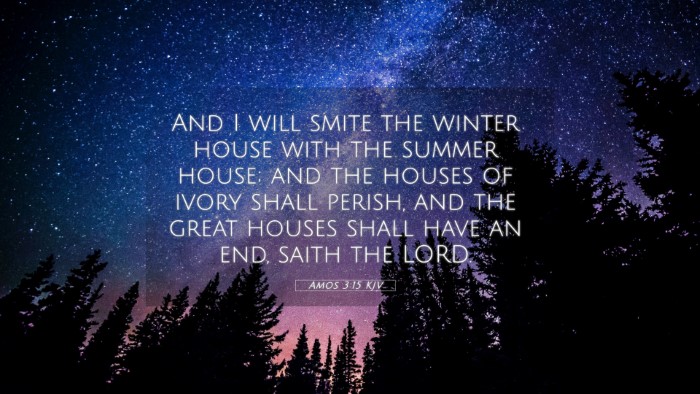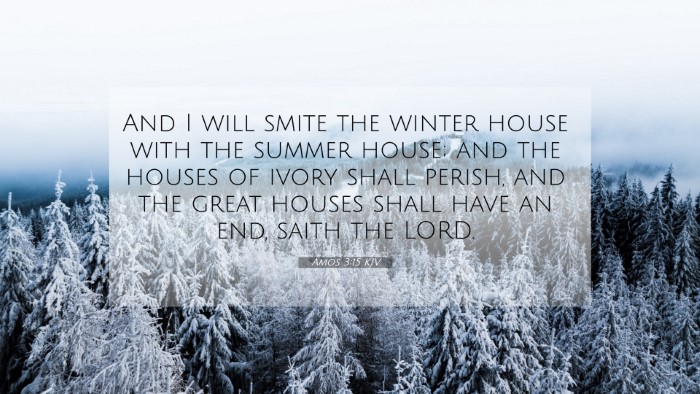Old Testament
Genesis Exodus Leviticus Numbers Deuteronomy Joshua Judges Ruth 1 Samuel 2 Samuel 1 Kings 2 Kings 1 Chronicles 2 Chronicles Ezra Nehemiah Esther Job Psalms Proverbs Ecclesiastes Song of Solomon Isaiah Jeremiah Lamentations Ezekiel Daniel Hosea Joel Amos Obadiah Jonah Micah Nahum Habakkuk Zephaniah Haggai Zechariah MalachiAmos 3:15 Similar Verses
Amos 3:15 Cross References
And I will smite the winter house with the summer house; and the houses of ivory shall perish, and the great houses shall have an end, saith the LORD.
Uncover the Rich Themes and Topics of This Bible Verse
Listed below are the Bible themes associated with Amos 3:15. We invite you to explore each theme to gain deeper insights into the Scriptures.
Amos 3:15 Cross Reference Verses
This section features a detailed cross-reference designed to enrich your understanding of the Scriptures. Below, you will find carefully selected verses that echo the themes and teachings related to Amos 3:15 KJV. Click on any image to explore detailed analyses of related Bible verses and uncover deeper theological insights.
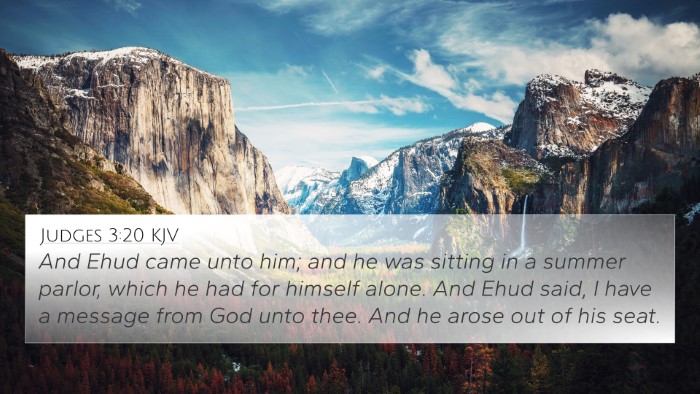
Judges 3:20 (KJV) »
And Ehud came unto him; and he was sitting in a summer parlor, which he had for himself alone. And Ehud said, I have a message from God unto thee. And he arose out of his seat.
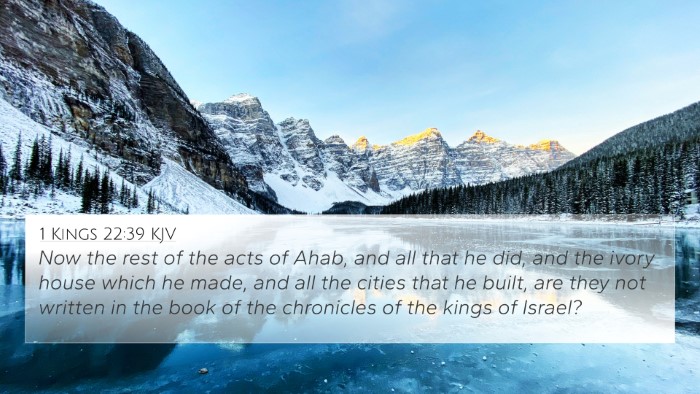
1 Kings 22:39 (KJV) »
Now the rest of the acts of Ahab, and all that he did, and the ivory house which he made, and all the cities that he built, are they not written in the book of the chronicles of the kings of Israel?
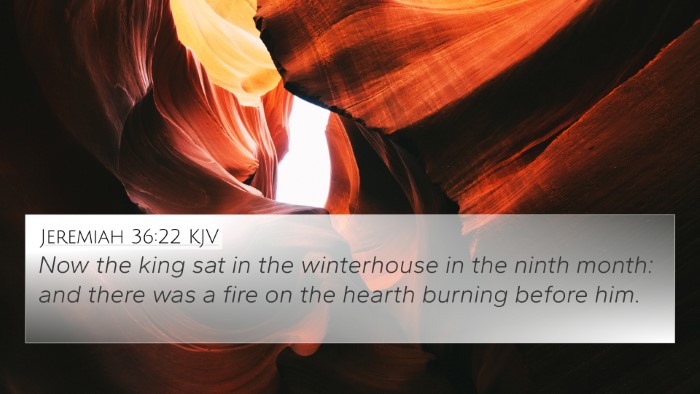
Jeremiah 36:22 (KJV) »
Now the king sat in the winterhouse in the ninth month: and there was a fire on the hearth burning before him.

Amos 6:11 (KJV) »
For, behold, the LORD commandeth, and he will smite the great house with breaches, and the little house with clefts.
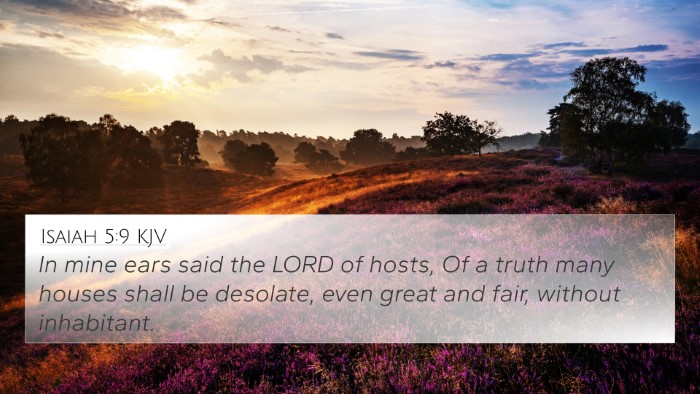
Isaiah 5:9 (KJV) »
In mine ears said the LORD of hosts, Of a truth many houses shall be desolate, even great and fair, without inhabitant.
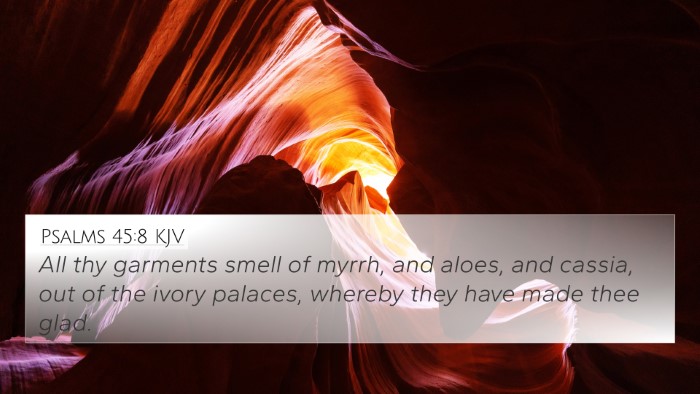
Psalms 45:8 (KJV) »
All thy garments smell of myrrh, and aloes, and cassia, out of the ivory palaces, whereby they have made thee glad.
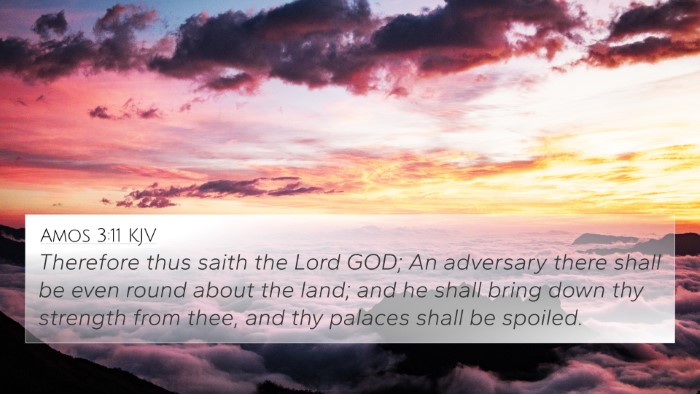
Amos 3:11 (KJV) »
Therefore thus saith the Lord GOD; An adversary there shall be even round about the land; and he shall bring down thy strength from thee, and thy palaces shall be spoiled.
Amos 3:15 Verse Analysis and Similar Verses
Amos 3:15 - Verse Overview
The verse Amos 3:15 states: "And I will smite the winter house with the summer house; and the houses of ivory shall perish, and the great houses shall have an end, saith the LORD." This verse forms part of a prophetic message delivered by Amos, emphasizing divine judgment and the consequences of worldly pride and luxury.
Meaning of Amos 3:15
Amos 3:15 addresses the wealthy and complacent inhabitants of Israel, whose trust in their material possessions would lead them to destruction. The imagery of both winter and summer houses symbolizes the transitory nature of earthly wealth and security. In this passage, God’s message through Amos is clear: no matter the season or status, judgment will come, and even the grandest houses will not withstand His wrath.
Insights from Matthew Henry
Matthew Henry emphasizes that God’s promise to destroy the houses indicates that the security and luxury that people rely on are ultimately not secure. He comments on how the distinctly named "ivory houses" represent opulence and luxury, which in turn, leads to certain judgment. Henry highlights that this serves as a reminder of God’s sovereignty over all material things.
Insights from Albert Barnes
Albert Barnes notes that this verse illustrates God's decision to bring down the proud and high-minded, specifically targeting the elite of Israel. He stresses that regardless of their wealth, God's judgment will sweep over them without prejudice. Barnes also connects this proclaiming the end of their false sense of security, signaling a shift from earthly fortunes to eternal realities.
Insights from Adam Clarke
Adam Clarke explains that the 'winter house' and 'summer house' symbolize temporal stability but emphasize the forthcoming destruction. He elaborates that those who have built their lives and hopes upon wealth will find themselves bereft of their possessions. Clarke concludes that God's purposes will unmake the oppressively rich while underscoring the fleeting nature of material wealth.
Connections to Other Scriptures
Amos 3:15 connects strongly to several other Bible verses. Here are biblical cross-references that resonate with its themes:
- Isaiah 39:6-7 - God warns that the wealth accumulated will be carried off to Babylon, emphasizing that material possessions do not last.
- Matthew 6:19-21 - Jesus teaches against storing treasures on earth, affirming that what we treasure reveals our hearts.
- 1 Timothy 6:7-10 - This warns against the love of money, highlighting its destructive potential.
- Proverbs 11:28 - This reflects the idea of placing trust in wealth, which can lead to downfall.
- Ecclesiastes 5:10 - King Solomon’s wisdom indicates the futility of chasing after riches and the harm it brings instead.
- Luke 12:20-21 - The parable of the rich fool warns that life's essence isn't found in possessions but in being rich toward God.
- Jeremiah 17:11 - This verse connects the fleeting nature of prosperity with divine judgment.
Thematic Connections and Interpretations
This passage invites a broader thematic exploration regarding the responsibilities of wealth, the perils of pride, and God’s justice. It stirs an examination of how personal affluence can corrupt faith and trust in God.
Tools for Bible Cross-Referencing
For deeper understanding and study, utilizing a Bible concordance can facilitate finding connections and supporting verses. Additionally, employing a cross-reference Bible study guide provides insights on themes and relevant scriptures.
Learning how to use Bible cross-references effectively can enhance comprehension of the interconnectedness of Biblical themes. It allows one to draw parallels and see how various scripture relates to Amos 3:15 and its warnings.
Conclusion
Amos 3:15 delivers a powerful message on the stark contrast between earthly wealth and divine judgment. Incorporating the insights of renowned commentators like Matthew Henry, Albert Barnes, and Adam Clarke, it becomes clear that this prophetic text is fundamentally about humility before God and the recognition that material possessions are ultimately at His mercy. Cross-referencing related scriptures reinforces this theme, guiding believers toward a deeper understanding of the values embedded within Biblical teachings regarding wealth and divine retribution.
